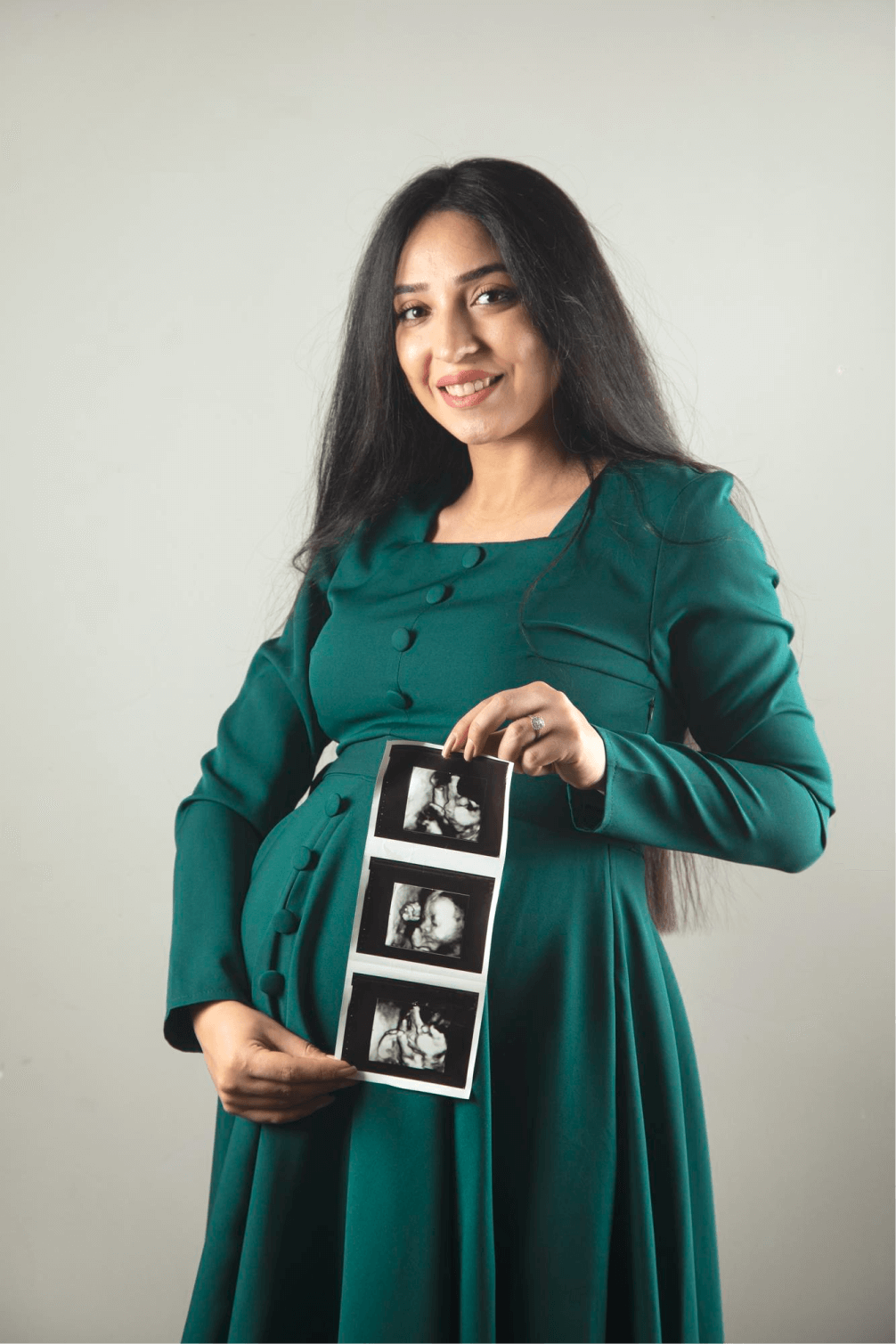Explore Your Interest
Your baby’s development begins this week even though your pregnancy started two weeks ago. During this week, a new life is gradually formed by the cluttering of cells; your sense of smell may be elevated by a rapid increase in your hormone level, which is one of the early symptoms of pregnancy.
Baby Development at Week 3
Fertilisation will take place in the third week of your pregnancy when the winning sperm meets your mature egg cell in the Fallopian tube during ovulation. This is the first step in your baby’s development.
Shortly after conception, your baby-to-be is already hard at work. The fertilised egg undergoes rapid cell division, starting approximately 30 hours after fertilisation. It divides into two cells, then four, then eight, and continues to multiply as it travels from the fallopian tube to the uterus. By the time it reaches the uterus, this cluster of cells has formed a tiny ball-like structure known as a morula.
As the morula progresses, it undergoes a transformation where it becomes hollow and begins to fill with fluid. At this stage, it is called a blastocyst, which then moves down to the lining of your uterus and begins to implant and grow into the wall of your uterus for the next nine months; this normally takes up to 6 days after fertilisation before implantation takes place.
If you are having fraternal or nonidentical twins, during week 3, there will be two zygotes, which are formed when different sperm fertilise two eggs during ovulation. These twins will not be identical, and they could be of different sex because they come from different zygotes.
This type of twin shares different placentas and umbilical cords and normally develops two separate amniotic sacs. They will have different chromosomes, determining your baby’s sex and physical traits.
Each zygote will develop into thousands of several hundred cells known as the blastocyst and burrow into the uterus lining during implantation at week 4.
Identical twins occur when one egg is fertilised to form a zygote and split into two to form two embryos (Twins) or three embryos (triplets). Depending on how early the zygote splits into two, these twins may share the same placentas or have different placentas, and they may or may not share the same amniotic sacs.
Because they come from the same zygote, they will have the same chromosomes, which determine their sex and physical traits; therefore, they will look alike and be of the same gender.
If a fertilised egg splits into two at the earliest stage of development when the zygote is no more than a cluster of cells, then your body, at week 3, is now nurturing identical twins.
Body Changes at Week 3
During ovulation, which is the release of a mature egg from the ovaries, some women may experience mild cramping and increased vaginal discharge. This egg then begins its journey through the fallopian tubes towards the uterus, while sperm travel through the uterus to fertilise it within the fallopian tube.
Only one sperm can fertilise an egg, and both contain 23 chromosomes, which combine to form a zygote with 46 chromosomes. At conception, many of your baby’s genetic characteristics, including gender, eye colour, and hair colour, are determined.
The zygote continues its journey through the fallopian tubes until it reaches the uterus and attaches itself to the uterine wall, initiating pregnancy.
Pregnancy Symptoms at Week 3
This week, you will continue to experience symptoms similar to those in week two. These symptoms can be due to changes in hormones that cause bloating, mood changes, fatigue, mild cramping, and tender breasts. These are also premenstrual symptoms and are significant signs of early pregnancy.
Implantation bleeding usually happens around the fourth week during embryo implantation to the uterus’s lining. A light vaginal bleeding may occur, which may be your first pregnancy sign. Not everyone experiences this symptom.
Throughout this week, your body’s basal temperature should remain elevated if you’re monitoring it. This is because temperature elevates during ovulation, consequently enhancing the chances of conception during this phase. You can use a basal body thermometer to track it accurately, measuring your temperature immediately upon waking up before getting out of bed.
Health Tips for Week 3

Undernutrition or unhealthy eating can adversely affect pregnancy outcomes and a child’s long-term health. Make eating healthy a priority in your pregnancy to nourish your body and baby.

Maintaining a healthy weight is substantial before and during pregnancy to avoid high BMI, which increases the risk of different pregnancy complications such as miscarriage and stillbirth, as well as gestational weight gain. Being active will also help you to reduce stress and enhance your mood.

Begin to take prenatal vitamins or continue if you have already started. Folic acid is the most important supplement you should take while waiting to conceive as it should not only be taken by pregnant women but among women of reproductive age before getting pregnant to prevent neural tube defects (NTDs).
These congenital disabilities develop during early pregnancy. The most common NTDs are spinal cord defects and brain defects.

Research has proved that repeating positive thoughts and statements to yourself can help to overcome fear and anxiety.
Words of affirmation like my body is ready to conceive, my womb is ready to nurture a new life, being patient will help my body prepare for the new life, I will be a good mother, can help you get mentally prepared while you are waiting for a pregnancy test. You have to repeat them often and believe in them to start making positive changes.

Let used to drinking at least ten full glasses of water regularly. Dehydration can cause contractions, dry mouth, decreased urination, and dizziness during pregnancy.

It is essential that you inform your doctor about your pregnancy as soon as possible, especially if you have a health condition, including diabetes or asthma, as these can affect your pregnancy. Pregnancy can also affect any health condition you have. Do not stop taking your medications until you get your doctor informed.
Health Tips for Week 3

Undernutrition or unhealthy eating can adversely affect pregnancy outcomes and a child’s long-term health. Make eating healthy a priority in your pregnancy to nourish your body and baby.

Maintaining a healthy weight is substantial before and during pregnancy to avoid high BMI, which increases the risk of different pregnancy complications such as miscarriage and stillbirth, as well as gestational weight gain. Being active will also help you to reduce stress and enhance your mood.

Begin to take prenatal vitamins or continue if you have already started. Folic acid is the most important supplement you should take while waiting to conceive as it should not only be taken by pregnant women but among women of reproductive age before getting pregnant to prevent neural tube defects (NTDs).
These congenital disabilities develop during early pregnancy. The most common NTDs are spinal cord defects and brain defects.

Research has proved that repeating positive thoughts and statements to yourself can help to overcome fear and anxiety.
Words of affirmation like my body is ready to conceive, my womb is ready to nurture a new life, being patient will help my body prepare for the new life, I will be a good mother, can help you get mentally prepared while you are waiting for a pregnancy test. You have to repeat them often and believe in them to start making positive changes.

Get used to drinking at least ten full glasses of water regularly. Dehydration can cause contractions, dry mouth, decreased urination, and dizziness during pregnancy.

It is essential that you inform your doctor about your pregnancy as soon as possible, especially if you have a health condition, including diabetes or asthma, as these can affect your pregnancy. Pregnancy can also affect any health condition you have. Do not stop taking your medications until you get your doctor informed.
Advice for Partners
- Bonding with your partner should be your major priority at week three before you start getting distracted by the news of your baby’s formation.
- Even if the pregnancy was planned, you and your partner may start to experience fears or anxieties. It’s essential to communicate openly with each other and discuss any concerns that arise.
- Encourage your partner to share her feelings and questions, demonstrating your desire to be actively involved in the pregnancy journey. Take the time to plan small gestures of support and surprises throughout the remaining 37 weeks, showing your love and commitment to her and your growing family.
Pregnancy Checklist at Week 3
- Continue to take a daily prenatal vitamin containing folic acid.
- Educate yourself on what to expect during the first trimester.
- Consider taking a pregnancy test early at week 3.
- Calculate your expected delivery date.
Key Facts
- Fertilisation occurs when a sperm fertilises the mature egg in the fallopian tube during ovulation.
- The mature egg released during ovulation travels through the fallopian tubes towards the uterus, while sperm travel through the uterus to fertilise it within the fallopian tube.
- Your basal body temperature will remain elevated during this week.
- Drink at least ten glasses of water daily to prevent dehydration, which can cause discomfort and complications during pregnancy.
- Week three is an ideal time to strengthen your bond with your partner before the excitement of pregnancy takes over.
- Ensure you continue taking a daily prenatal vitamin that includes folic acid to support your baby’s development.
Frequently Asked Questions
Your pregnancy at week 3 is not up to a month. When implantation occurs next week, you will be one month pregnant, and then you will have eight beautiful months to look up to.
At week 3 of pregnancy, you are still in the first. The first trimester lasts from week 1 through week 13 of pregnancy. At week three, conception has likely occurred, and the fertilized egg has implanted itself into the uterine lining. This marks the beginning of embryonic development.
The embryo in your body is incredibly small and doesn’t resemble a baby yet. Instead, it appears more like a cluster of cells. It’s about the size of the head of a pin, measuring approximately .0019 inches (.048 mm) in length. Despite its tiny size, if it were not inside your body, it could potentially be seen by the human eye.
At week 3 of pregnancy, you have approximately 37 weeks to go until full term. Typically, pregnancies last around 40 weeks from the first day of your last menstrual period (LMP) to the estimated due date. Since conception usually occurs around week 3 of pregnancy, you still have most of the pregnancy ahead of you at this stage.
You will most likely not notice any symptoms at week 3 of your pregnancy. However, every pregnancy is different, and not everyone will experience all of the early signs of pregnancy, it is also entirely normal if you do not notice any symptoms yet.
The blastocyst (early stage of embryonic development) is experiencing rapid growth and multiplication. A portion of the blastocyst will develop into the placenta, an organ that produces hCG (human chorionic gonadotropin), the hormone detected by pregnancy tests.
Additionally, amniotic fluid accumulates around the cells, providing protection and cushioning for the developing baby throughout the pregnancy. This week marks the start of crucial foetal development, including the brain, spinal cord, heart, and gastrointestinal tract formation.
Frequently Asked Questions
Your pregnancy at week 3 is not up to a month. When implantation occurs next week, you will be one month pregnant, and then you will have eight beautiful months to look up to.
At week 3 of pregnancy, you are still in the first. The first trimester lasts from week 1 through week 13 of pregnancy. At week three, conception has likely occurred, and the fertilized egg has implanted itself into the uterine lining. This marks the beginning of embryonic development.
The embryo in your body is incredibly small and doesn’t resemble a baby yet. Instead, it appears more like a cluster of cells. It’s about the size of the head of a pin, measuring approximately .0019 inches (.048 mm) in length. Despite its tiny size, if it were not inside your body, it could potentially be seen by the human eye.
At week 3 of pregnancy, you have approximately 37 weeks to go until full term. Typically, pregnancies last around 40 weeks from the first day of your last menstrual period (LMP) to the estimated due date. Since conception usually occurs around week 3 of pregnancy, you still have most of the pregnancy ahead of you at this stage.
You will most likely not notice any symptoms at week 3 of your pregnancy. However, every pregnancy is different, and not everyone will experience all of the early signs of pregnancy, it is also entirely normal if you do not notice any symptoms yet.
The blastocyst (early stage of embryonic development) is experiencing rapid growth and multiplication. A portion of the blastocyst will develop into the placenta, an organ that produces hCG (human chorionic gonadotropin), the hormone detected by pregnancy tests.
Additionally, amniotic fluid accumulates around the cells, providing protection and cushioning for the developing baby throughout the pregnancy. This week marks the start of crucial foetal development, including the brain, spinal cord, heart, and gastrointestinal tract formation.
1. Aune, D., Saugstad, O.D., Henriksen, T. and Tonstad, S., 2014. Maternal body mass index and the risk of fetal death, stillbirth, and infant death: a systematic review and meta-analysis. Jama, 311(15), pp.1536-1546.
2. American Pregnancy Association. 3 Weeks Pregnant.
3. Mayo Clinic. Twin pregnancy: What twins or multiples mean for mom.
4. Nemours Kids Health. Week 3
5. Runjati, R. and Nurcahyani, A.S., 2021, April. The Impact of Self-Affirmation Towards Stress and Anxiety Levels of Pregnant Women. In International Conference on Psychological Studies (ICPSYCHE 2020) (pp. 46-53). Atlantis Press.
6. Healthline. Symptoms of Severe Dehydration During Pregnancy.





